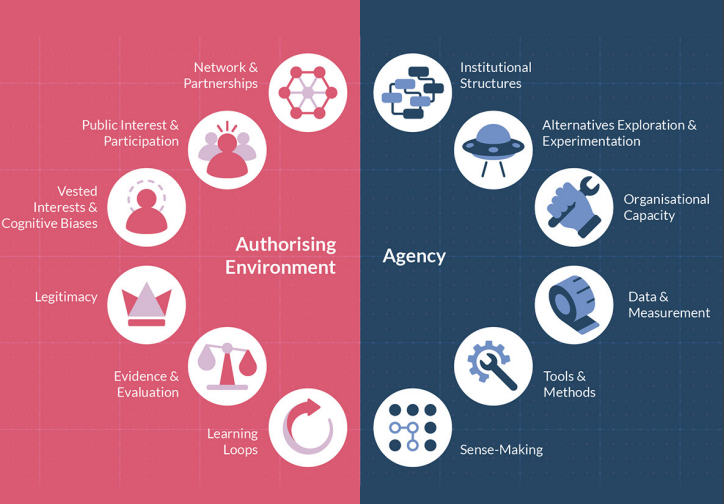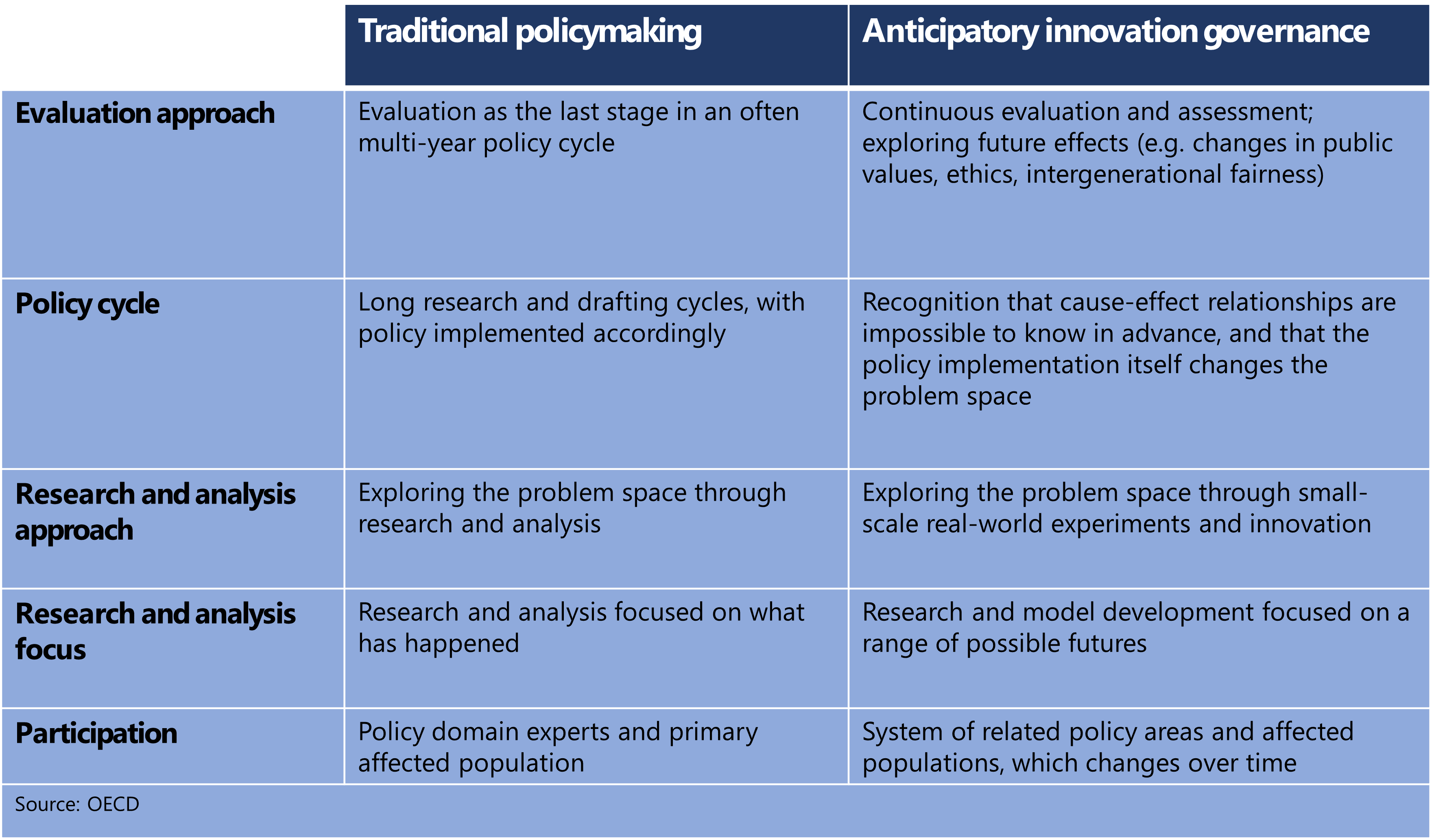Complex problems are increasingly the norm rather than the exception. In response, governments must systematically and actively monitor sources of information for early signs of emerging trends, disruptions, opportunities, and changes that may have significant future implications. Governments need to develop capacity to actively explore possibilities, experiment and continuously learn. Enhanced capacities for anticipating as well as experimenting with innovations can make policies more resilient to unanticipated changes. Such an approach strengthens the social contract, fosters public trust, and promotes a more agile and resilient governance in the face of huge societal trends, such as ageing populations, shifts in the future of work, disruptive technological developments, and a changing climate.
Anticipatory governance
In an era characterised by rapid technological advances, environmental shifts, changing demographics, geopolitical tensions, and evolving societal needs, traditional governance models are increasingly under pressure. Governments worldwide are seeking ways to not only respond to present challenges but also to anticipate and shape future possibilities. Anticipatory Innovation Governance is a proactive approach that integrates foresight, innovation, and continuous learning into the heart of public governance.

Key messages
Building anticipatory governance capacity in public administrations is a multifaceted challenge that demands creating space for exploration, envisioning possible futures, and taking proactive decisions, which are inherently difficult when the return on investment is unclear and when immediate and obvious problems demand attention. Administrations often struggle with rigid structures, entrenched processes, and a risk-averse culture that stifles innovation and imagination. Encouraging alternatives exploration and flexibility requires a significant shift in mindset, fostering an environment where futures thinking is valued and integrated into routine operations and decision-making. The complexity of this task is compounded by the need to balance short-term demands with long-term planning, overcome bureaucratic inertia, and engage diverse stakeholders. However, some governments analysed by the OECD show promise in building up their anticipatory capacity, demonstrating that progress is possible.
There is often an impact gap between knowledge about the future and its use to shape government practices. Governments equipped with the capacity to continuously use anticipatory intelligence and strategic foresight has a critical advantage in navigating the complexities of the modern world and prepare policy solutions. By embedding foresight, alternatives exploration, and experimentation into their policymaking processes, these governments are not merely reacting to the challenges as they arise but are proactively preparing for a range of future scenarios. This approach enables them to stress-test their policies and systems, identifying vulnerabilities and opportunities. As a result, these governments can adapt more swiftly and effectively, ensuring continuity and stability in governance and safeguarding the well-being of their citizens against the unpredictable nature of future challenges.
Context
Embracing anticipatory innovation requires agency and an authorising environment
Agency empowers individuals and organisations to proactively explore and experiment with innovative solutions, while an authorising environment provides the necessary validation, resources, and policy frameworks to facilitate such endeavours. This relationship between the capacity to innovate and the permission to do so is crucial for cultivating a culture of forward-thinking governance that is prepared to meet the demands of an ever-changing world.

Capacity must be intentionally and persistently supported since the dominant system of traditional policymaking will tend to deprioritise anticipatory innovation
Anticipatory innovation in policymaking systems and the public service is broad-based capacity to actively explore possibilities, experiment, and continuously learn. The prevailing systems of traditional policymaking and public administration inherently leans towards prioritising immediate concerns and known challenges. This entrenched inclination can inadvertently sideline anticipatory innovation, necessitating deliberate efforts to build and sustain the capacities needed for forward-looking governance. Cultivating skills and capabilities as well as an environment where anticipatory innovation is valued involves not just a shift in mindset but also strategic investments in training, resources, and policy frameworks that champion long-term thinking and experimentation.

Latest insights
-
 oecd-opsi.org23 April 2024
oecd-opsi.org23 April 2024 -
 oecd-opsi.org4 December 2023
oecd-opsi.org4 December 2023 -
 oecd-opsi.org26 October 2023
oecd-opsi.org26 October 2023
Related publications
Related policy issues
-
Governments today must be able to adapt to changing environments, work in different ways, and find solutions to complex challenges. OECD work on public sector innovation looks at how governments can use novel tools and approaches to improve practices, achieve efficiencies and produce better policy results.Learn more
-
Governments must develop their capacity to adapt and change the way policies and services are designed and delivered if they want to implement ambitious reform agendas, meet climate targets and respond to global crises. Without intentional efforts, innovation is left to chance, fuelled sporadically by circumstance and crises. Our work helps governments assess and improve their innovative capacity, providing practical and evidence-based steps to embed innovation in policymaking and administration.Learn more
-
Digital government explores and supports the development and implementation of digital government strategies that bring governments closer to citizens and businesses. It recognises that today’s technology is a strategic driver not only for improving public sector efficiency, but also for making policies more effective and governments more open, transparent, innovative, participatory and trustworthy.Learn more
-
The current global context highlights the need for governments it to further modernise their public administrations to increase government capacity and resilience in response to the current set of crises and to global, crosscutting challenges.Learn more







